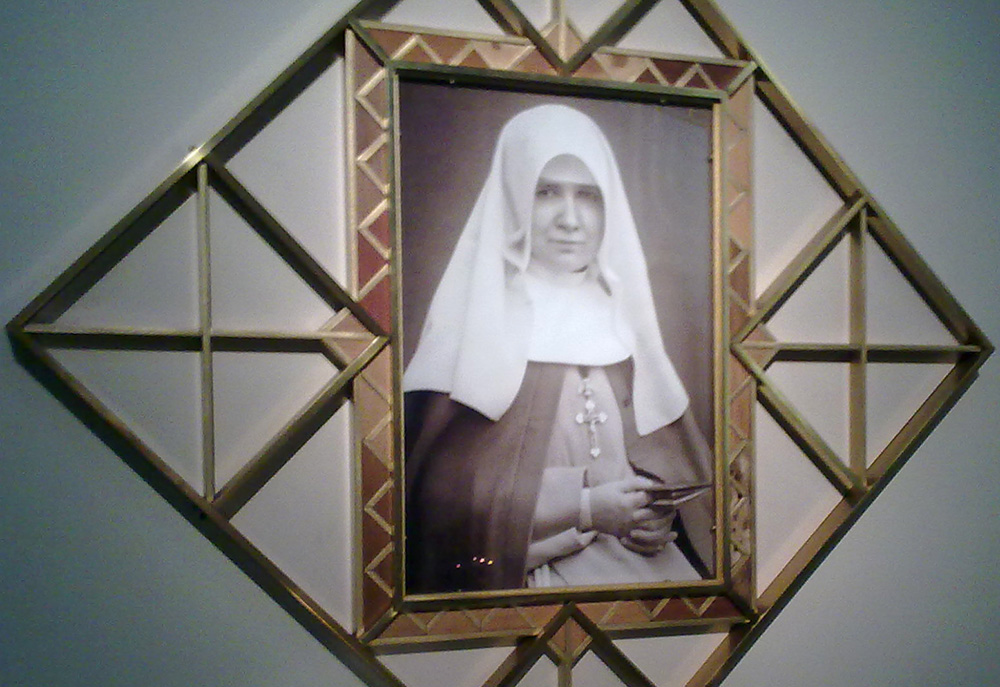
A portrait of Blessed Helena Stollenwerk, Mother Maria, is seen in the Mission House in Steyl, the Netherlands (Wikimedia Commons/Andreas Alexander Ulrich)
I was moving several articles from one room to another. Four young girls were there to help me. As we began the work, three of them carried the lightest articles in the room and walked away, leaving me and the other girl with two heavy bundles to carry. Their attitude irritated me, and with annoyance, I tried to lift the heavy one by myself.
The remaining girl stepped in immediately and said, "Ma’am, it's heavy; please leave it to me. I will carry."
I do not know from where that lean, fragile-looking girl got the strength to carry stuff, but I was sure she had a caring heart that didn't allow her to let her teacher carry the heavier burden.
"To God, the honor; to my sisters, the benefit; and myself, the burden" is the profound quote of Blessed Mother Maria Helena Stollenwerk (1852-1900), co-founder of Missionary Sisters Servants of the Holy Spirit. A lesser-known saintly nun who longed to be a missionary ended up sending missionaries to different parts of the world.
Ever since I entered this congregation, I have been hearing about Mother Maria, and I could not grasp her enough, as I am able to do now. Over the years, I realized what makes someone so special, even reaching up to the altar of veneration.
In this era where the natural growth of goodness is reduced and overpowered by instantaneous fame, remembering the qualities of our founding generation is an apt reminder to live more human.
When I think of Mother Maria, three of her qualities surface as a checklist for every religious today.
Advertisement
The young Helena Stollenwerk and her companions had to work as maids in the Mission House in Steyl, the Netherlands, while they waited for Fr. Arnold Janssen to begin a congregation for women. "Work is worship" goes an old saying. But for Mother Maria, work was worship, and that didn't substitute the time for worship.
Prayer is part of human existence. Moreover, it is the lifeline of every consecrated man and woman, particularly. Ironically, prayer has become a routine activity. While technology makes our work easier, how we use the surplus time is a big question! The comfort culture that creeps into our religious houses puts us into a drowsy syndrome even with the slightest extra labor.
For many of us, the one thing that we would forego at the end of a heavy day is spending a substantial time with God. It may sound redundant or inappropriate to our neomodern lifestyles, that Mother Maria and her companions knelt at frequent occasions throughout the day to offer oneself in prayer, even when they were tied to hard labor.
Another quality of Mother Maria is putting the other first. In the history of the congregation, it is said that although she was the right choice to be the first superior of the newly founded congregation, someone else was picked by the founder than Mother Maria. That didn't hamper her in any way. Working closely with the new superior, they both built up the congregation in a short span of time.
Power struggles and ego clashes have become the dirty game that ruins the novelty of consecrated life. The crab mentality, sustaining vote banks, CEO model (hire and fire), functionality, living as spendthrift, and individualism rather than collaborative mission are the few hunches we carry collectively.
It's a real challenge to live with the attitude of "I must decrease, and they must increase!"
In the 21st century, we take pride in our communication technologies. We live beyond time and space barriers. Reaching out to someone at any given time is just a matter of a few clicks on our smart device.
Well, thanks to the new technology, we have more contacts than friends, followers than relatives, likes than appreciations. Yes, it's the boon of web 2.0.
Back in the late 19th and early 20th century, distant communication was maintained through pen and paper mode. Pens and paper, too, were scarce.
While composing the biography of Blessed Mother Maria, the authors compiled all her letters to sisters at different occasions and made a book. She lived a short life; at the age of 47, she died. Her lion's share of life lived in the clumsy kitchen of the Mission House.
'To God, the honor; to my sisters, the benefit; and myself, the burden.'
—Blessed Maria Helena Stollenwerk
The very few years she lived as the consecrated nun and the co-founder of the congregation, she kept regular correspondence with the sisters who were already sent to the mission countries.
It may sound ordinary, but the fraternal care that involved letting someone know that they are cared for and prayed for took immense effort.
When I was in different stages of formation in the early 2000s, our formators used to instruct us to write Christmas/New Year cards to sisters in different missions and to different religious houses. That simple act of penning down a few lines made us feel that we belong to a larger family. After all, communication is the lifeline of any relationship.
Years have gone by, and in my recent memory, I haven't received any surprise cards — electronic or hard copy — from any such secret Santa! Was it a futile activity that we were engaged in, or do relationships not need a lifeline anymore to sustain them?
Love and care are not just passive words; they are active verbs. True care and love must be manifested in action. It is also an ability to transcend to the needs of the other, a gesture of companionship.
The curse of our time is that when digitalization dived into humanity, humans were deported to post-humanity! We get tied up with bulk emails, messages, notifications and calls. It's not a lack of infrastructure, but a lack of interest that hinders us from mutual correspondence with each other.
The religious congregations need to chunk down the vertical models and create an ambiance of horizontal relationships, a synodal model, inclusive and transparent.
Prayer, humility and sincere fraternal love mark the short yet well-lived life of the saintly nun Blessed Maria Helena Stollenwerk. These attributes were not mere virtues; rather, they were action verbs. She lived them.
Back in the history of every congregation, there will be a "Mother Maria," who has done significant yet less-noticed things to keep the flame aloft. May our patron intercessors in heaven bestow upon the graces that they lived in total surrender to the mission of God.







